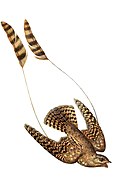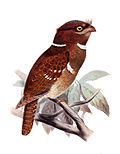| Streamertail | |
|---|---|
 | |
| Scientific classification | |
| Domain: | Eukaryota |
| Kingdom: | Animalia |
| Phylum: | Chordata |
| Class: | Aves |
| Clade: | Strisores |
| Order: | Apodiformes |
| Family: | Trochilidae |
| Tribe: | Trochilini |
| Genus: | Trochilus Linnaeus, 1758 |
| Type species | |
| Trochilus polytmus Linnaeus, 1758 | |
| Species | |
1-2, see text | |
The streamertails are hummingbirds in the genus Trochilus that are endemic to Jamaica. It is the type genus of the family Trochilidae. Today, most authorities consider the two taxa in this genus as separate species, but some (e.g. AOU) continue to treat them as conspecific, in which case T. scitulus is a subspecies of T. polytmus. A wide range of common names applies to this combined species, including green-and-black streamertail, Jamaican streamertail, or simply streamertail. The name "streamertail" is a reference to the greatly elongated rectrices of the males.











